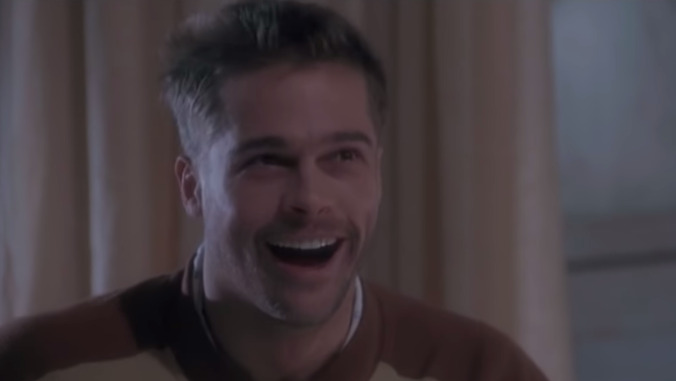Brad Pitt was nominated for an Oscar in 1995 for his livewire turn in Terry Gilliam’s 12 Monkeys, a distinction he readily earned with the twitchy bundle of tics he weaves into the character’s paranoid ramblings. It’s those early, indelible scenes in a mental institution that you likely remember, and, in a new interview with the New York Times Magazine, Pitt seems fine with that.
“I nailed the first half of 12 Monkeys,” he said. “I got the second half all wrong.” Pitt goes on to acknowledge the character’s deception, that the most interesting depiction of him isn’t the one that perseveres throughout Gilliam’s twisty sci-fi noir. “That performance bothered me because there was a trap in the writing. It’s not the writing’s fault, but it was something that I couldn’t figure out. I knew in the second half of the film I was playing the gimmick of what was real in the first half—until the last scene—and it bugged the [expletive] out of me.”
Pitt is critical himself throughout the interview, acknowledging what he considers to be his failures both onscreen and off. For example, he cites Wolfgang Petersen’s Troy—a big-budget riff on Homer’s Iliad—as the movie that made him only want to “invest in quality stories.”
It was really a turn on Troy. I was disappointed in it. When you’re trying to figure things out in your career, you get a lot of advice. People are telling you that you should be doing this, and other people are saying you should be doing that. There was this defining film I never got to do, a Coen brothers film called To the White Sea. We had an opportunity to go, and then it was shut down. Then another interesting opportunity arose, and instead I was talked into: “No, you need to be doing this other thing. You can get to your art project later.” I ended up taking that advice.
And you made Troy?
No, it wasn’t Troy, it was another thing. But that really made me think, I’m following my gut from here on out. I had to do Troy because—I guess I can say all this now—I pulled out of another movie and then had to do something for the studio. So I was put in Troy. It wasn’t painful, but I realized that the way that movie was being told was not how I wanted it to be. I made my own mistakes in it. What am I trying to say about Troy? I could not get out of the middle of the frame. It was driving me crazy. I’d become spoiled working with David Fincher. It’s no slight on Wolfgang Petersen. Das Boot is one of the all-time great films. But somewhere in it, Troy became a commercial kind of thing. Every shot was like, Here’s the hero! There was no mystery. So about that time I made a decision that I was only going to invest in quality stories, for lack of a better term. It was a distinct shift that led to the next decade of films.
You can see the shift, too. Pitt took up producing just a few years later and began appearing in challenging, left-of-mainstream films like Andrew Dominik’s The Assassination of Jesse James by the Coward Robert Ford and Alejandro G. Iñárritu’s Babel, as well as the Coens’ Burn After Reading, Quentin Tarantino’s Inglourious Basterds, and Terrence Malick’s The Tree Of Life. (World War Z remains the outlier.)
Pitt goes on to compellingly discuss his persona, acid, Kalifornia, and his two big roles of 2019—in Once Upon A Time…In Hollywood and Ad Astra—in the rest of the interview, which you can read here.

